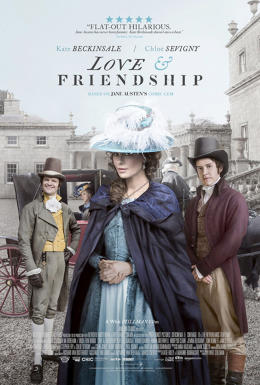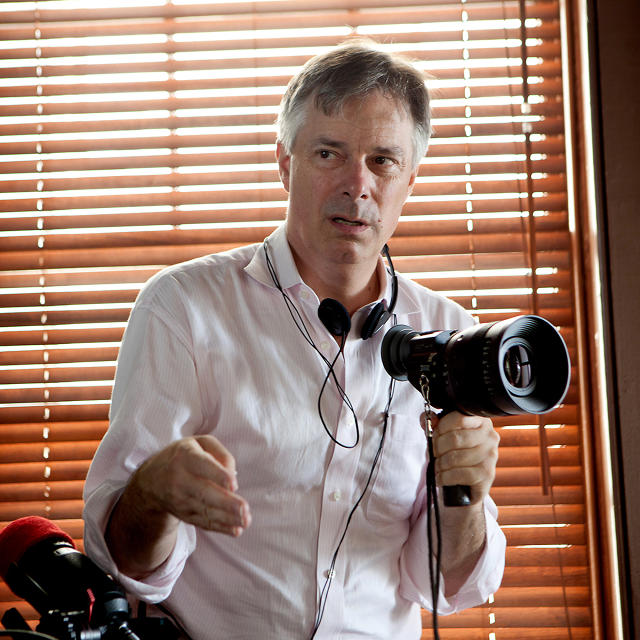How Whit Stillman’s “Terrible Period” Made Him A Better Filmmaker
With the films Metropolitan, Barcelona, and The Last Days of Disco, Whit Stillman immortalized the 1% percent milieu of coming-of-age WASPs in the era of Izod’s and Drakkar Noir. In the process, the writer-director became a required cultural icon for aspiring sophisticates—or, U.H.B.s (urban haute bourgeoisie), as Whitman classified his subjects. His autobiographical films were quotable, quippy satires of a class that is typically treated with cartoonish condescension. Stillman chose to bestow on them traces of dignity, slyly defending their nostalgia for a simpler time when old money and a Seven Sisters degree was the equivalent of dropping out of Harvard to found a startup.
But then he disappeared. Or so it seemed. After the release of Disco in 1998, Stillman moved with his family to Paris (he also spent time in London), where he lived for the next decade. During that time he produced no films. It all felt a bit Salinger-esque—one of Stillman’s heroes—only the filmmaker was actually very busy while in Europe and was in no way trying to fall off the grid. If anything, he was attempting to stretch creatively and write scripts that had nothing to do with privileged Manhattanites. He penned an adaptation of Red Azalea, Anchee Min’s memoir about growing up during the cultural revolution in China, and another one about Jamaica in the 1960s. But deals fell apart, promising investors turned out to be not so promising, and, in the case of Red Azalea, he has said that he was pushed off the project when Oliver Stone became interested in making the film.
Stillman’s “terrible period,” as he calls it, ended in 2011 with Damsels in Distress, a comeback homage to self-righteous preppies starring Greta Gerwig. In 2014 he did a pilot for Amazon, The Cosmopolitans, which is best described as Metropolitan set in Paris. And now comes Love & Friendship, a loose adaptation of the Jane Austen novella Lady Susan that he says is a direct result of his hard-knocks years on the Continent. The film reunites the Disco duo of Chloë Sevigny and Kate Beckinsale, with Beckinsale as Susan, a loquacious, widowed seductress intent on marrying off her daughter and herself. Sevigny plays her Yankee bosom buddy, a character whom Stillman created for his film, which he says is “about two-thirds Austen, one-third mine.”
Love & Friendship was acquired by Amazon at the Cannes Film Festival in 2013, and received rave reviews when it screened at Sundance earlier this year. Through Amazon’s partnership with indie distributor Roadside Attractions, it will receive a full theatrical release before it hits the streaming platform, which Stillman says is crucial. “It’s so much more fun seeing this kind of film with other people. It’s such a perfect film for going out as a couple and seeing the film, or even taking the kids. What I’m most proud of is, I’ve finally gotten a PG rating.
“It’s PG PG. I don’t know why it’s not G,” he jokes. “There is something a little racy in the film at one point and not entirely Austenian. But I don’t think any kids are going to be offended by it—or parents. I mean, they might ask some questions about biology and pregnancy, but that’s all therapeutic.”
He went on to talk with Co.Create about being a late bloomer, how his struggle trying to get films made have made him take more ownership of his projects, and being blown away by actor Tom Bennett.
THE ADVANTAGE OF BLOOMING LATE

Stillman was in his late-30s when he made Metropolitan and was so self-conscious of his age that he silently rejoiced when he was interviewed by the New York Times two days before his birthday. But now he says his age was a benefit to his art and gave him the proper perspective and distance to be able to comment on the experiences that provided the fodder for his first three films.
“I’m not sure what my material would have been if I’d have started earlier. I probably would have started with Damsels in Distress kinds of films, because that’s the kind of comedy I was writing in college. So I didn’t really have any life experience to work off of. I would have just been doing pure comedy, kind of silly stuff. And I hadn’t, for instance, gotten to like Jane Austen. I hadn’t gotten to like Evelyn Waugh. So I kind of needed late blooming, I think, to have material. I read one Jane Austen in college and didn’t like it at all and told everyone how much I disliked it. I read Northanger Abbey sophomore year in college and hated it. I didn’t read good Austen until after college, maybe a couple years out. By the time I was in my 30s, I kind of had the retrospective material that I could look back in time to periods like Metropolitan and write about them, and my time in Barcelona and all that.”
LEARNING TO BE A SELF-EMPOWERED ARTIST
While living in Europe, Stillman was encouraged by a “lawyer-agent-manager type” to “do things the industry way” and not just set up small, indie films on his own. “I suppose that meant these projects that have producers attached. There’s a book, it’s optioned, you get a screenwriting deal to do the adaptation, get a studio involved, they read the drafts you do, and they give you notes,” he says. “They all get together and talk about it, and then they give you notes.”
Stillman found the process “kind of offensive.” There were numerous cooks in the kitchen, with various producers and financiers “jumping on the call and then so-and-so jumping off the call. All these people were kind of plotting behind my back about what they thought about the draft. And it was just a lot of wheels spinning for nothing to happen. A lot of this was happening out of the London film business, which I didn’t really get along with very well. I remember, you know, they’d gone to the three funding sources and didn’t get backing. And I thought, well, okay, we just started this and three places have turned us down, but there are 50 other places to try. And it was like, ‘No, we’re dead. The three places—the two TV networks and the one film council—have turned us down. We’re dead. We can’t do anything.’ And I said, ‘Well, what about private investment? They said, ‘Oh, the American film model? The American independent film model?’ I said, ‘Yeah.’ But it was this thing where, oh, we take our project to these three funding sources and if two of them don’t say yes, then we’re dead. Go on to the next project, get a paycheck on someone else’s film, don’t worry about this guy with his script. So it’s very producer-oriented and not filmmaker-oriented. It was frustrating over there.”
The lesson of it all, Stillman says, was to be a more empowered filmmaker. “I learned that you have to say that you’re a filmmaker. You’re not a screenwriter, you’re not a director for hire. You’ve got to take charge. You’re a filmmaker and you’re going to make a film. And not just, I have a deal at such and such a studio to write a script, and then we’re going to make it into a film later. No. You have to say, I’m making this film. And you can’t lose sight of that. And you’ve got to do it in any way possible. It’s really hard.
“You have to constantly work on your script if it needs it. You don’t accept, oh, I did a draft and . . . No, it’s your responsibility to work on the script as much as possible and make it better and better. You get with good casting people. You audition, get the right people. You don’t cast anyone unless they’re right. I mean really right. And then you slowly assemble the financing and you go way down in budget if you have to. You make it for next to nothing if you have to do that.”

TAKING THE PRESSURE OFF
With Love & Friendship, Stillman followed his own advice. He took his time working on the script and kept it under wraps until he felt entirely confident that it was complete.
“The frustration of working with these producers who didn’t do anything, and being in a situation of sort of musical chairs and revolving doors, made me say, well, I’m going to do this one (Love & Friendship) on my own, pretty much. I will just keep it secret and not talk about it. I’ll just work on it over time. I’m not getting paid for a script. I will come back to this—I’m not going to push it and force it and get it done in a certain amount of time. I’m just going to let it happen as a fun, good project.
“And it was sort of gratifying, because it was always in kind of a readable form. From the very beginning, the script was readable as a script, even if it wasn’t doable as a film. So I could show it to my older daughter—I could show it to friends I was staying with on vacation, and they’d read it and really like it and think that it was great material. So that countered some of the frustration of not having a ‘go’ project. And then I brought it out briefly, encouraged by my manager to go out for some great actress parts. The talent agents really liked it, but I reread the script and said this is not ready. This is back in 2010. I did Damsels in Distress and I came back to it after that, rewrote it again, took it to the 2013 Cannes Film Festival and things started rolling.
“Meanwhile, we had a really good casting guy finding the background parts, the less star parts, which, actually, you can do much better casting for the other parts, generally because the star parts have all sorts of considerations and nonsense. Then I got to do this pilot for Amazon, which was really great. And then finally we got a situation where Kate Beckinsale became free and we got to offer her the star part, which was always the idea. Myself and a lot of people involved in it always thought Kate Beckinsale was the best part for Lady Susan.
“I hadn’t thought of Chloë, exactly (who stars in The Cosmopolitans). I was thinking of her for other projects I have. But Kate, definitely, I thought of for Lady Susan from the very outset. Not as a planned Disco reunion from the outset. But when I read Lady Susan, I thought of Kate right away. I love getting in the Connecticut material with Chloë. I did that with her in The Cosmopolitans. We really had no scene for her, and so I wrote scenes for her. I thought for this I could get into the whole British-American unlikely cousins relationships and the scorn for the U.S. and for Connecticut.”
RECOGNIZING BRILLIANCE
Stillman also elaborated the part of Sir James Martin (played by Tom Bennett), the doltish suitor with whom Lady Susan tries to set up her daughter—a rather different turn of events ensues. The character was originally written as a more marginal player, but when Stillman saw Bennett perform, he started coming up with more lines for him.
“Tom Bennett had that comedian’s performance gift where you could take rather thin material and make it really funny, so I wanted to write more scenes for him.”
Bennett’s talent came to light during an early table read that was otherwise “miserable,” Stillman says. “It went really badly. Tom was on Skype, and there’s this guy’s face on a laptop listening to us, and then one-third of the way through, he had his first scene and it was hysterical. It saved the atmosphere. We loved it. And he had a few more scenes and we loved them. And then I started thinking about stuff that Sir James Martin could do.
“Tom came by the set one day just to put on costumes, and we were finishing early for the day, so I said, ‘I want to shoot something with him! He’s here, he’s going back to London or Brighton or wherever he lives. I want to shoot something with him!’ And someone said, ‘If we shoot something, we have to pay him for the day.’ ‘I said, ‘Okay. We can afford that.’ And so then I said, ‘I want him talking to Lady Susan about giving her a loan and hiring a carriage for her. I wrote it right then. And then they said, ‘We don’t have time for Kate to change into a new outfit and do her hair and all of that. Not enough time.’ So I said, ‘Okay, Kate will be behind the door. Sir James, you stand in front of the door.’ We were shooting in one location but it was really supposed to be in another location, but we got it done. It’s in the film.
“And then I wrote this more elaborate scene. I was up at three or four o’clock in the morning writing James Martin scenes and then emailing people PDF’s to print up. And he would just get the material and instantly do these incredible comic riffs.”
Fast Company , Read Full Story
(34)














